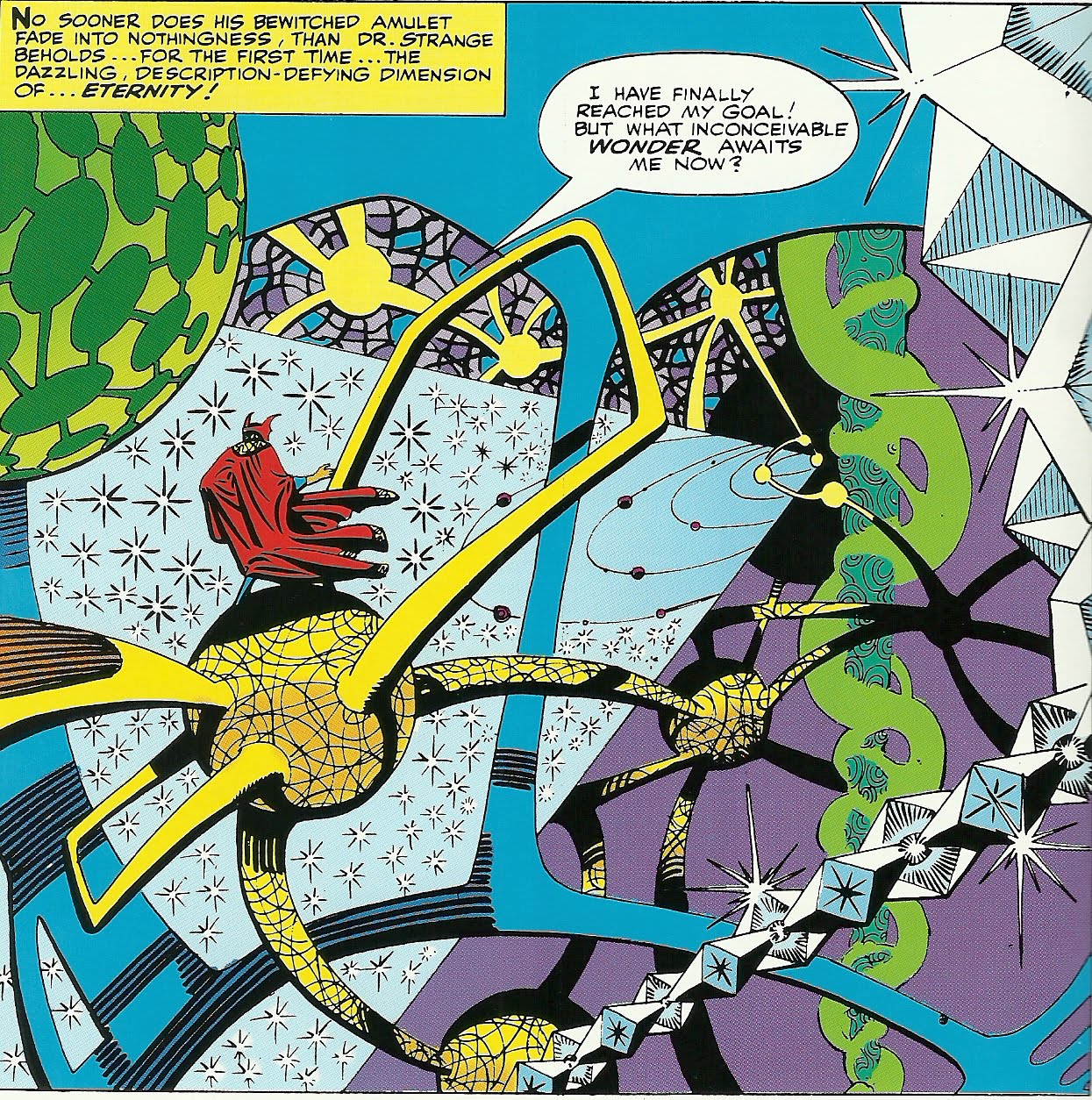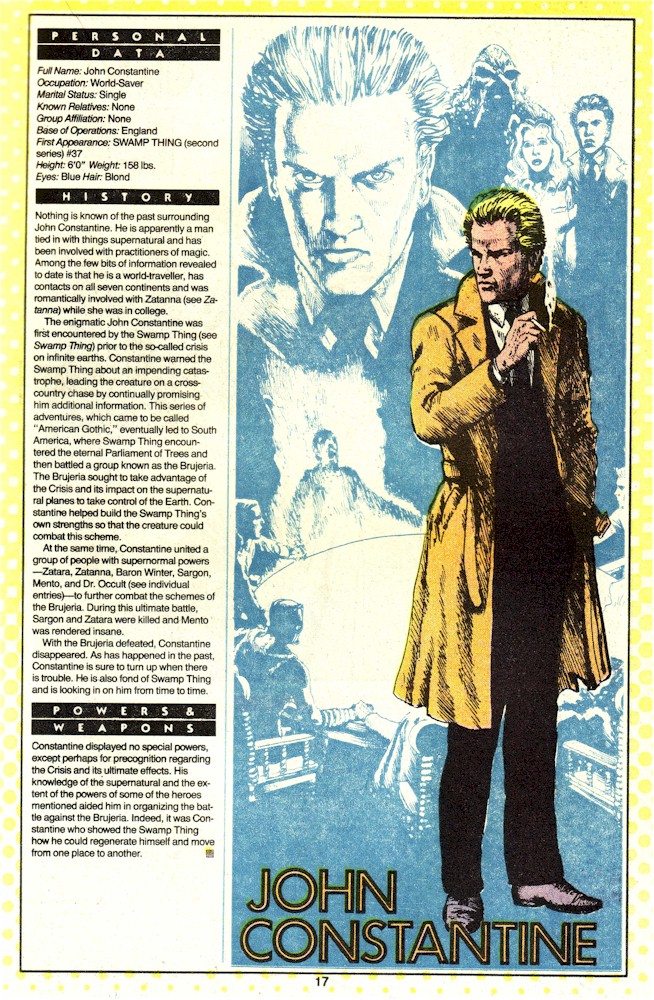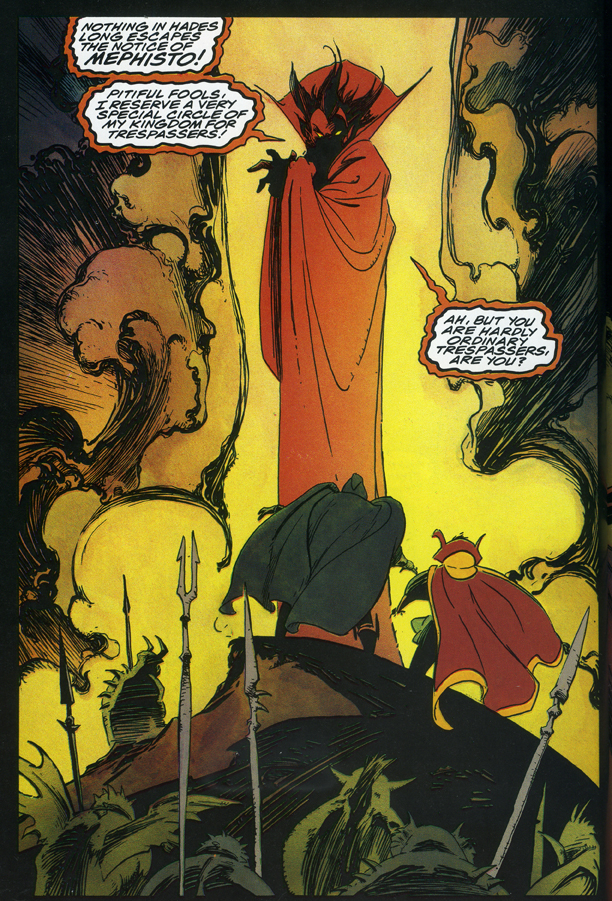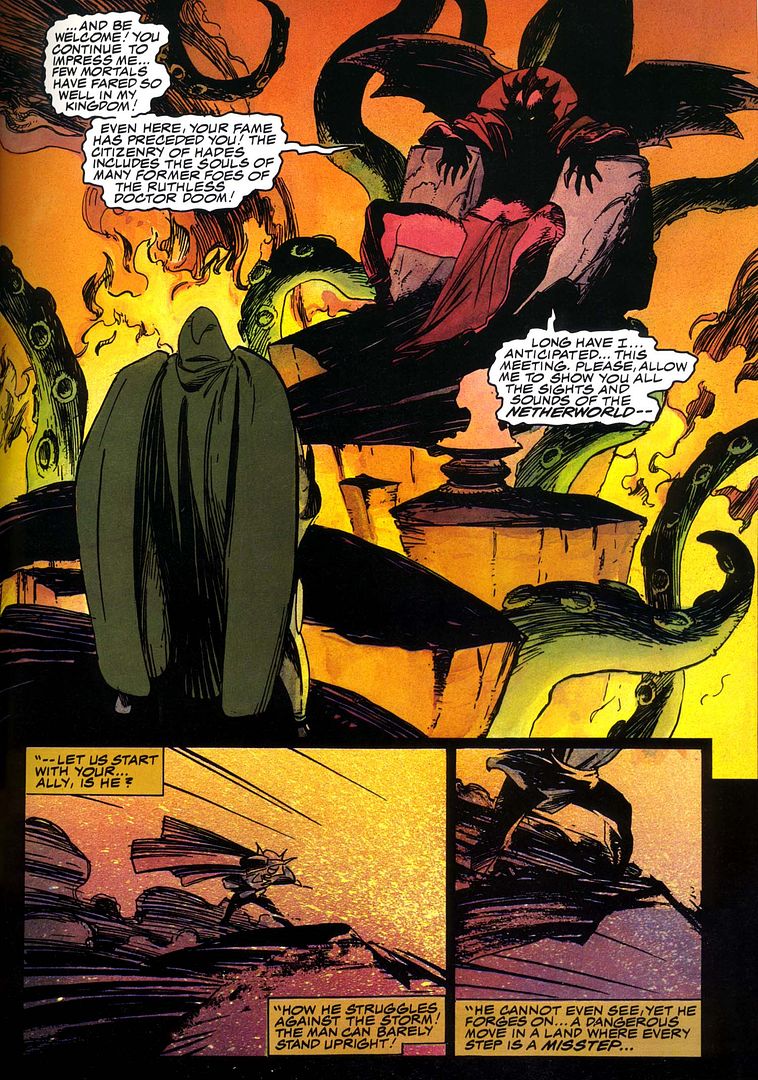The new forums will be named Coin Return (based on the most recent vote)! You can check on the status and timeline of the transition to the new forums here.
The Guiding Principles and New Rules document is now in effect.
[Retrospective]Doctor Strange and Doctor Doom: Triumph and Torment
Bobby Derie Registered User regular
Registered User regular
 Registered User regular
Registered User regular

I said I'd do this one because I wanted to differentiate between how Marvel and DC have handled the development of the magic side of their universes, and this is a pretty good example. But first, a little background.

Steve Ditko did great backgrounds.
Comic book universes, particularly the older ones like Marvel and DC, tend to be agglutinative. Which is a four-dollar word meaning that they build up over time, instead of coming forth fully-formed. This is not a terrible way of doing things, as different creators can come up with different concepts, and then other creators borrow or draw connections between those different creations and thus form a much richer setting. As a process, both Marvel and DC have gone through periods of free creativity without respect to anything else, and periods of interconnection and codification - this applies to the magical aspects of their universe as much as anything, and it's part of the dynamic of "continuity" and "canon." The balance that most creators like to strike is between "tells a good story" and "makes sense in the context of what has happened before." In a pinch, many (I might say most) will prefer the former over the latter; it's why we have "comic book time" where characters don't age and backstories get quietly amended so that events during the Reagan administration are still acknowledged to have happened, but maybe without focusing on the fact that 20+ literal years have passed and the characters should be in their 50s or 60s by now.
"Magic" in comic book universes suffers more from this trend of building and ignoring continuity than some other other aspects, largely because creators tend to have a very low fantasy approach - by which I mean that magic often doesn't have any real rules; the writer thinks "Well, it's fantasy, like a fairy tale, so magic can do anything!" and just goes nuts. This is fine for standalone stories like fairy tales, but it's hell on continuity, because different writers have an extremely hard time "balancing" or incorporating these one-off, magic-can-do-anything elements in any kind of systematic way - which is why characters like Doctor Strange are so hard to write for. As Sorcerer Supreme and Master of the Mystic Arts, Doctor Strange's limitations tend to be extremely fickle based on the writer, where one rhymed couplet can save the couplet and another fails to stop a mugging for no adequately explained reason. It was, in effect, the same issue as Silver Age Superman having too many powers, and is why Superman reboots (hard and soft) tend to limit or lower his abilities or insert some new weaknesses; the same can be said for Doctor Strange. In the 80s and early 90s, both Marvel and DC strove to address that particular bugbear by more clearly by presenting a much clearer idea of how magic for all magic-users in their universes worked.


Arguably, Marvel was more successful because it went into greater detail and more restrictions - DC was still largely stuck with it's "magic can do anything, but people tend to blast each other with coloured rays" approach. But the most important differences are that Marvel focuses much more heavily on the concept of magical entities that grant power, and has developed a much larger cast of them, their home dimensions, and their relations to Earth and each others; second, DC has in its various continuity re-writes lost a lot of material and common ground that tied some of its magical background together. This is most notable in the split between the Vertigo titles and the mainstream DC universe, but there are also some slightly more subtle losses from the Golden and Silver Age of comics. Sadly, the repeated soft-and-hard reboots have rather taken their toll on both companies, so at this point the creators are basically free to draw on continuity or ignore it as they will...but, it's important to appreciate comics not just for what they are, but how they got there. So, back to the retrospective.

The Marvel Universe has a position - you might say a ranking - called the Sorcerer Supreme; he or she is the most bad-assed magician in that particular 'verse. (DC doesn't quite have an equivalent position, though the current Doctor Fate tends to fill in the role in everything except name.) The position is delineated not just by the title, but by a bevy of artifacts that act as badges of office, and the blessings of the Vishanti, a group of extradimensional magical beings that grant special powers and privileges to the holder of the position. Dr. Strange inherited the title from his master, the Ancient One...but in this book, he has to confirm it, in a battle royale against every other particularly puissant magic-user on the planet (which, because this was a standalone graphic novel and presumably not allowed to piss in anyone else's ponds, is why regulars like Jennifer Kale, the Scarlet Witch, Agatha Harkness, aren't invited - but I digress).

Surprisingly, one of the guys to try out for Doctor Strange's job is Doctor Doom. More surprisingly, he comes in second place. As runner-up, Doom gets to claim a boon from Strange - and decides Strange will help him rescue the soul of his mother, Cynthia von Doom, from the clutches of Mephisto. Cue the second act, where the Fantastic Four's arch-enemy and the Sorcerer Supreme team-up to invade Hell...


The reason why this works is in large part because all of the bits and pieces are in keeping both with Strange and Doom's backstories and character. While Doom is mainly known as a scientist, his dabblings in magic are at the core of his character history, and trying to contact his mother's soul in Hell was the reason he got his face blown up in the first place.

It's a point that's been revisited more than once.
The thing is, Doom is a very interesting character - noted as a villain, but not your normal punch-clock villain. He is, like Magneto or Thanos, a complex character driven by different motivations and often looking to achieve some tangible goal, with vast power but their largest internal weakness is something internal. For example, they consider their word their bond, or refuse to finish off a helpless opponent or harm a child. These are characters that, by and large, may not see themselves as heroes, but they are generally (when written well) committed enough to their own personal ethos, and that code of belief is close enough to classical codes of behavior, that they can act both heroic or villainous as the situation may be. And Doctor Strange knows that - but hey, a promise is a promise. They're both men of their word, and whether they admit it or not, they have a lot in common.

This would be developed further in other books; I mean hell, they both learned their mystic arts in Tibet (cf. Doctor Druid, Brother Voodoo).
The invasion of Hell goes about as expected, with its twists, turns, and bits of great dialogue...

I have often maintained that one of DC's greatest weaknesses from a magical standpoint is that they have a primary agent of God - the Spectre - front and center, but no central Satan-figure comparable to Mephisto. Lucifer doesn't count; they wrote Vertigo out a long time ago, and Neron is just annoying.
Whether you like the art on this or not depends on whether or not you like Mignola; he wasn't at the full flower of his layout and stark, gothic powers and freedom here as he was in Hellboy, but the scenes are well-crafted and balanced, and the individual set-pieces like the entrance of Mephisto are great. Kirby krackle is present in vast amounts.

...eventually, they win. But they win on Doom's terms, which are appropriately hardcore: by getting his mother to reject his evil, Cynthia von Doom goes directly to Go Heaven, out of Mephisto's reach forever. All it cost him was his mother's love - and, of course, now he doesn't owe Strange anything.
Keep that in mind: Dr. Doom probably could have asked Strange for help at any time. But Doom does not beg. It's these types of personalities and character relationships which have helped set the tone for Marvel's magic scene, where DC's...tends not to do as well. The idea that Doctor Doom might be the second-run for Sorcerer Supreme cropped up, notably, in the whole New Avengers run after World War Hulk where Strange had given up the title, and it underlies their working relationship in the whole Secret Wars comic - these are guys with a history, and to a certain extent they respect and admire each other, but there's a definite edge to the trust there. DC really doesn't have anything comparable - their magic scene tends to be just a mess, rather than the interesting sort of complicated you got in marvel; though it looked like they were working on something after the Spectre killed Shazam to re-organize things, but that was pretty much all wiped away with the New 52.
Now, I'm not going to say that this comic is required reading - it's very solid and enjoyable, but the continuity has shifted so dramatically from where it was when it was published, I don't even know if it's considered canon anymore. Nor does it really matter. For the relationships, some great art and solid dialogue and pitch-perfect characterization, it's great. If you want to see a proto-Hellboy Mike Mignola, it's great for that too.
+12
Posts
In a lot of ways, I think Doctor Doom has largely replaced Baron Mordo (who is technically dead, but that hasn't stopped a handful of appearances in recent years) or Dormammu as Strange's main antagonist, especially since Strange can't really hold his own title these days.
Sex & the Cthulhu Mythos
I'm not so sure. I mean, Doom is sometimes an antagonist for Strange, but, especially with the latest Hickman stuff, Doom and Strange seem to respect each other too much for that role. It feels less like they're enemies, and more that they're men who sometimes happen to find themselves at cross-purposes. I mean, Luthor will traditionally take any chance for a cheap shot at Big Blue. Joker wants to break Batman. Osborn HATES Parker. Even Doom will wreck years of planning if he thinks it'll give him a leg up on Richards.
Doom and Strange? Unless they happen to both be going after the same thing anyway, they can be civil with each other. Not exactly nemesises.
Why I fear the ocean.
Sex & the Cthulhu Mythos
I also note that Marvel's system of magic, largely involving extra-dimensional entities granting spells when invoked, has fallen into pretty serious disrepair. The last time the Vishanti were mentioned, they were said to be dead off-panel. You'd think that would have a big impact on the whole Sorcerer Supreme shtick, given their role there, but it hasn't been raised since. Former entities of this sort, like Shuma-Gorath, Dormammu, and Cytorrak, have largely been lumped in with the Hell-Lords and demons of Marvel, whereas they used to be distinct. As for the remaining multiversal Principalities, they have ceased to effectively exist. You still sometimes get a character invoking their names in a spell, but they almost never show up themselves, and most of them (and their domains) never got much character development before Strange's series was cancelled in the 90s. They're just names and some vague attributes. At one point they were considered some of the major multiversal powers, but now we've got to the point where a major story about the collapse of the multiverse doesn't mention them at all, and once they and all their realms were theoretically destroyed, magic continues to function unimpeded, with characters still calling on them in invocations as window-dressing.
It'll be interesting to see how (or if) the upcoming Dr. Strange ongoing by Aaron addresses any of that.
I also have, for a long time, and maybe I'm off-base here, gotten the impression that DC magic has taken its ques from many of their Vertigo series, like Sandman or Hellblazer. Magic in DC often takes the form of colored rays and shields, but you also more frequently see the idea of gods and supernatural beings arising from belief, or the idea of old-school sympathetic magic, things not as well established in Marvel. After all, gods in Marvel often exist or are created independently of belief, and it has its own magical framework for how spells work, even if it's ignored a lot.
The most organized DC magic has ever been was around about the time Books of Magick came out, which together with the History of the DC Universe (which also needs a retrospective) combined about 90% of the most important magical setting elements together, and you're right that DC's magic from the 80s on depended largely on Vertigo, with anything outside of that tending to the cartoonish...but I think it's important to take another look at that, so thanks for reminding me.
One thing I largely forgot to mention is that for the most part, magic in comics was divvied up between the cartoonish "explanation for anything inexplicable or impossible" and "the occult." The former is why you have a lot of gold and silver age characters that use magic, or described in magical terms - like Mr. Mxyzptlk being called "an imp," despite the general science fiction nature of being a 5th-dimensional alien being. The latter was more largely associated with horror (and, to a lesser extant, occult detectives) - which is why, in the 1950s, when the Comics Code Authority came into being, it stepped down hard on pretty much any comic with occult connotations, which is why cartoonish magic proliferated during the 50s and 60s.
In the late 60s and 70s though, things started to change; Marvel, DC, and others began bucking the Code in small ways, looking to publish horror-ish comics that the CCA would approve, or else like Warren bypassing the code entirely with comic magazines. Marvel lacks the golden age roots for a lot of their characters, which is part of the reason for Ditko's success - he could make it up out of whole cloth; DC does have gold and silver age roots though (and that's why characters like Doctor Fate seem to stand on the border between cartoonish magic and occult trappings, with Dr. Strange based more than a little on Fate). When DC started to seriously revive its horror lines in mature form in the 80s, the magic characters it had like The Spectre, Dr. Fate, Zatara, Dr. Thirteen, and Sargon the Sorcerer had definite old-school roots - they were basically the survivals from the horror purge of the '50s.
Of course, because of the "mature" nature of the Vertigo line (and, probably, low sales for everything except Sandman), there was the general split with the DCU - but like Nextwave, some of the stuff coming out of Vertigo was too good not to use. But Marvel never really had that kind of split, never had a John Constantine analogue as such (even when Warren Ellis was writing Druid and Hellstorm, that was all technically in canon, as it were). It looks now that Marvel is making something of a clean(er) slate of it, and after so many reboots I've entirely lost track of what DC is doing. But it pays to remember that if you look at the history, the CCA impacted a lot more on the development and nature of comics in America than you might think.
Sex & the Cthulhu Mythos